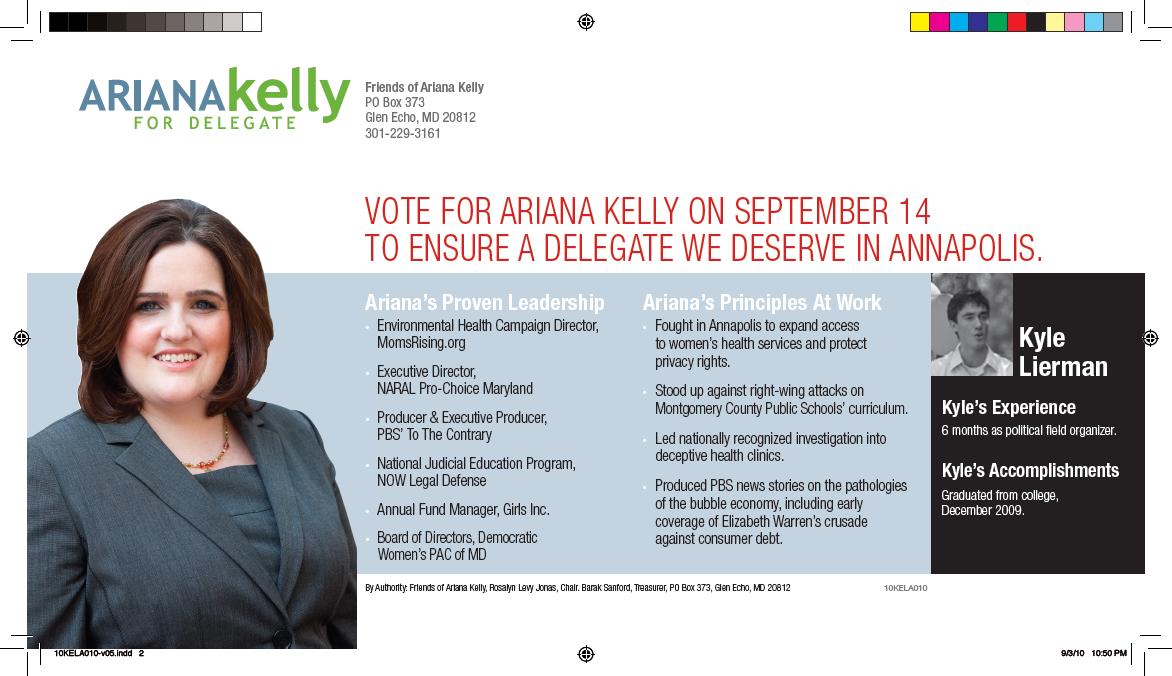By Adam Pagnucco.
Let’s begin this column with a story from days past.
The year was 2010. In April, long-time District 16 Delegate Bill Bronrott resigned to take a job in the Obama administration. The Montgomery County Democratic Central Committee (MCDCC) then gathered to appoint a successor to his seat, as they are empowered to do under state law. The problem they faced is that the primary election was only five months away, and any appointee would get a leg up in running against any non-appointed opponents. So MCDCC Chair Karen Britto – affectionately nicknamed “the Iron Lady” – came up with a solution. She persuaded MCDCC to appoint her to the seat and in return she would not run, effectively becoming a caretaker. That set off an electoral fracas with no one other than the two remaining incumbents (Susan Lee and Bill Frick) having an advantage.
District 16, which includes Bethesda and parts of Chevy Chase, is arguably the most politically active legislative district in MoCo and perhaps all of Maryland. In addition to the incumbents, 11 other candidates jumped into the race. The two non-incumbents who rose to the top were Kyle Lierman, brother of future comptroller Brooke Lierman and son of Maryland power broker Terry Lierman, and former NARAL Pro-Choice Maryland Executive Director Ariana Kelly. Both had plenty of money. Both worked hard for the seat. Both had endorsements, with Lierman landing MCGEO and CASA in Action and Kelly earning support from MCEA, SEIU and the Sierra Club. But Kelly had a crucial advantage:
Of the 11 non-incumbents, she was the only woman. And then as now, women are nearly 60% of MoCo’s Democratic primary electorate.
Kelly understood that advantage and exploited it. In July, she wrote a blog post titled “Did I Walk Into the Men’s Locker Room?” In it, she wrote, “Interestingly, I am the only woman in the field competing for the open seat. That’s right, it’s me and ten guys. Here in Bethesda, this is shocking. Our community has a tremendous number of well-educated and accomplished women who would make excellent legislators. That’s why, historically, Montgomery County has been a leader in electing women.” She went on to note the decline of women in MoCo’s statehouse delegation since 2002.
She also made the risky decision to go negative on Lierman. Kelly had substantial professional experience going well beyond her tenure at NARAL, while Lierman was 24 and had just graduated from college. After repeatedly going after Lierman online (including with a brutal Google ad saying “a delegate seat is not a graduation present”), Kelly sent a contrast mailer comparing her experience with Lierman.


Kelly’s contrast mailer from 2010.
Kelly wound up defeating Lierman by just 356 votes in the 2010 primary. She would go on to serve for 14 years in the Maryland House of Delegates and State Senate as an effective voice on women, children and family issues before joining Governor Wes Moore’s administration last year.
So why did I take this trip down memory lane, other than the good fun of printing negative political mail? Kelly’s candidacy was an important demonstration of the potential for gender advantage in MoCo politics. Yes, Kelly was a substantive and accomplished candidate with money and endorsements who would have been competitive under any circumstances. But being the only woman running against ten non-incumbent men was a big advantage. And she rode that to victory.
Fast forward to today. Of the ten local jurisdictions in Maryland with a county executive (or in Baltimore’s case, a mayor), MoCo is the only one of them to never be led by a woman. We are a huge anomaly considering the domination of our Democratic primary electorate by women. The 2018 candidacy of Rose Krasnow, a relatively little-known former Rockville mayor and planning department manager, demonstrated how one woman in a field with five men could outpace more experienced male politicians. I bet if Council Member Nancy Floreen, a much better-known four-term incumbent, had run she would have done much better and perhaps won the election.
Right now, the county council has six first-term women who account for a majority. They range across the ideological spectrum from progressive advocate Kristin Mink to former local chamber of commerce president Marilyn Balcombe. Two of them (Kate Stewart and Natali Fani-Gonzalez) are committee chairs. Stewart is a former mayor. Fani-Gonzalez is a former planning board member. Laurie-Anne Sayles (the only female at-large member) is a former city council member. Dawn Luedtke is a whip-smart former state assistant attorney general. In political terms, this is an embarrassment of riches. As these women perfect their ability to operate as elected officials, they could become the most dominant group of women in MoCo’s recent history.
So why don’t any of them take a shot at the executive’s chair? Here is the conventional wisdom behind their calculations. The executive is limited to two consecutive terms while the council members are limited to three consecutive terms. These female council members are all finishing their first term. So they could take a pass this time, serve two more terms, build their records and political bases and run as stronger candidates when the executive seat opens up again. That’s an understandable point of view.
Here’s the problem: lots of them are making the same calculation. Two terms from now, a bunch of them will all run for executive. And so none of them will have Ariana Kelly’s advantage of being the sole competitive woman in a race otherwise filled with men. Instead, to the extent that there is a female vote (and a good argument could be had about that), it will be diluted and unavailable for exclusive claim by any of them. In fact, if a field were to contain five women and one man, the man could get elected. (I have seen crazier things in MoCo politics!)
And so the conventional wisdom could very well be wrong. If just one female council member gets into the current county executive race and faces three top-tier men (Council Members Andrew Friedson, Evan Glass and Will Jawando), she might have a better chance of winning than if she waits two terms and encounters a field full of her female colleagues. The bold move – the unconventional, risky move – might just be the winning move.
Think about it.
